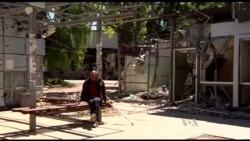Yekaterina Ivanovna had just fallen asleep in her home here Saturday when a boom outside her door jarred her.
Shells fall almost every night in this part of town, north of the city’s train station, according to residents. Ivanovna said she didn’t know where this one came from and was relieved it hurt no one. But there’s no guarantee for the next one.
"How can I stay alive, how can I survive in this small house?" Ivanovna said in Russian, standing in a wall-papered room strewn with rubble. "I do not have any basement. I cannot run to the summer kitchen because I am old."
The ongoing fighting in eastern Ukraine threatens a February cease-fire and strains war-weary civilians like Ivanovna who are caught in the crossfire.
The Organization for Security and Cooperation in Europe (OSCE) says cease-fire violations are spreading. In areas held by Russia-backed rebels, many tend to blame authorities in Kyiv, though most seem more interested in peace than breaking away from Ukraine. But even if peace eventually takes hold, winning back hearts and minds in this rebel-held city is going to be a challenge.
Ivanovna, like others here, thinks her best option is to stay.
"I am ready to sit hungry, as long as they don't shoot," she said. "I want to die my own death, but not under this bombardment, not under this fear that flies in the sky."
Finding shelter
In another neighborhood, some choose to sleep underground in a makeshift bomb shelter.
Baba Masha and her family have been living here since November, when a shell hit a neighbor's house and the shock wave blew out their windows.
"I really hope we will soon go back home," the elderly woman said. "If the war had not happened, we would live in this damaged" house.
As many as 28 children live in the bunker, which sometimes loses water and electricity, said Ira Batura, a homemaker.
"We were told there is no truce anymore, that it was completely broken. We are simply sitting here, scared, without knowing what is going to happen next," she said.
While Kyiv and western governments say Russia is fueling the conflict, Batura holds Ukrainian President Petro Poroshenko responsible. She questioned whether residents ever can trust authorities in Kyiv.
"What kind of trust can it be? What kind of state? It has been broken. There is no state any more," Batura said. "I doubt someone will put it back together. And, how can they put it together if people are already cursing him?"
But Batura said she and like-minded residents are not against being part of Ukraine as long as there is a lasting, political solution.
"If they do it in a peaceful way and stop the firing and the war," she said, "then people will accept this."
Another view
In the city of Kramatorsk, construction worker Denis Sakhno said it’s obvious who has been doing the fighting.
"I saw a couple Russians [troops] here when it all began," he said. "They were drunk and trying to buy liquor with rubles."
Sakhno, whose mother is Russian, supported the Russia-backed rebels – until he saw how their forces were behaving. But by then, he’d split with his wife, Lyudmila, an ethnic Ukrainian, partly because of their difference of opinion.
Since then, Sakhno has become a vocal supporter of a united Ukraine. Ukrainian troops pushed the Russia-backed rebels out of Kramatorsk and the city is now back under government control.
While life goes on, there are no immediate prospects for peace.












